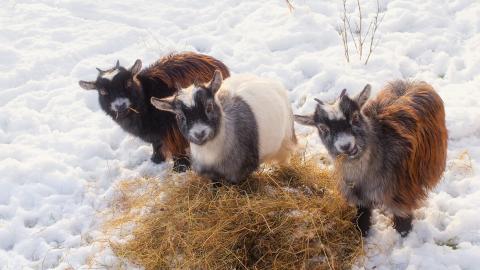Basic Winter Care for Livestock

Another summer gone and school has started. I’m thinking about adjusting my driving schedule to avoid buses, heat for the house, my winter garden, and preparing my animals and their winter digs for the long, cold days and nights ahead. It’s a New England thing, we spend the warm days preparing for the cold ones. Brrr.. it’s cold away from the wood-stove, but winter doesn’t mean you can neglect livestock care. Quite the contrary. Preparing now can make it much easier once the snow flies. Here are some basic things to consider.
Animals in a closed barn environment during the winter months will still need fresh air, which means good ventilation. A warm, tightly closed barn may seem comfortable to us, it’s not so for livestock. Good air exchange is important to eliminate ammonia gas that causes respiratory problems. It also lowers communicable diseases associated with a close contact environment. Alternatively, drafts should be avoided.
Living areas will need to be cleaned of manure and wet bedding routinely, depending on the species. Chicken pens in late fall and in early spring, depending on stocking density, can be sufficient. Sheep and goats and other pebble makers can be bed packed so constant cleaning isn’t necessary. As for pigs, horses and cows, daily cleaning should stay on your chore list.
Proper exercise during the winter is also important. Make sure your animals have enough space to move around.
Think about obstacles and problems making animal care/daily chores difficult. How do doors open and close in relation to the snow? Did you have ample lighting? Is your walk to the barn at night dark, slippery, and dangerous? Now is the time to remedy these conditions.
If you pasture livestock during the winter, you need to provide a three-sided shed, the open end of this shelter should have a southern exposure. Your pastured animal doesn’t need a blanket if they have a good winter hair coat and adequate shelter. Keeping your animals “dry and out of the wind” works.
Meeting nutritional requirements for body temperature maintenance and growth during the winter months is important. Free choice, loose, salt and minerals are needed in addition to good clean water, plenty of hay and grain (depending on species). If you can, provide heat to the water, temperature should be around 50 degrees F. This will increase your livestock’s winter water consumption, thereby aiding digestion, and preventing low-level dehydration. This is especially critical for lactating animals.
By feeding good quality hay, and I stress good quality, your livestock will begin the winter in good body condition. If they’re not in a “production stage” supplementing their diet with extra energy, grain is probably unnecessary. Check out our Extension fact sheets for specifics on feeding animals at different production states and understanding hay quality. Poor nutrition shows up quickly in the winter months.
Some other things to consider:
- You will need at least 50 bales of hay per adult ewe or doe to get you through an average winter.
- Trimming hooves in late fall, and again in mid-winter, decreases slipping on ice.
- Animals to be bred should be up to date on vaccinations, a wellness check by your vet it a good idea. While there, have the vet check for internal and external parasites that can stress livestock.
Trouble with body lice and mites? Now is a great time to clean and spray all the nooks and crannies in the barn to get rid of those pests. Doing it now makes it easier to keep animals away from the pesticides until they dry. Also it’s a good idea to understand the life cycle of these pests so you can treat the area with pesticide at least twice to catch any insects that hatched after the first application.
So now that I have depressed you, and brought you firmly into the realities of your long winter nap (HA!), remember, your wood stove and a good book are waiting for you after chores are done and your animals will be healthier and happier for your efforts.
Got questions? The Ask UNH Extension Infoline offers practical help finding answers for your home, yard, and garden questions. Call toll free at 1-877-398-4769, Monday to Friday, 9 a.m. to 2 p.m., or e-mail us at answers@unh.edu.

